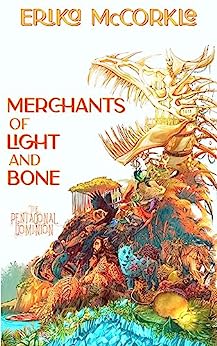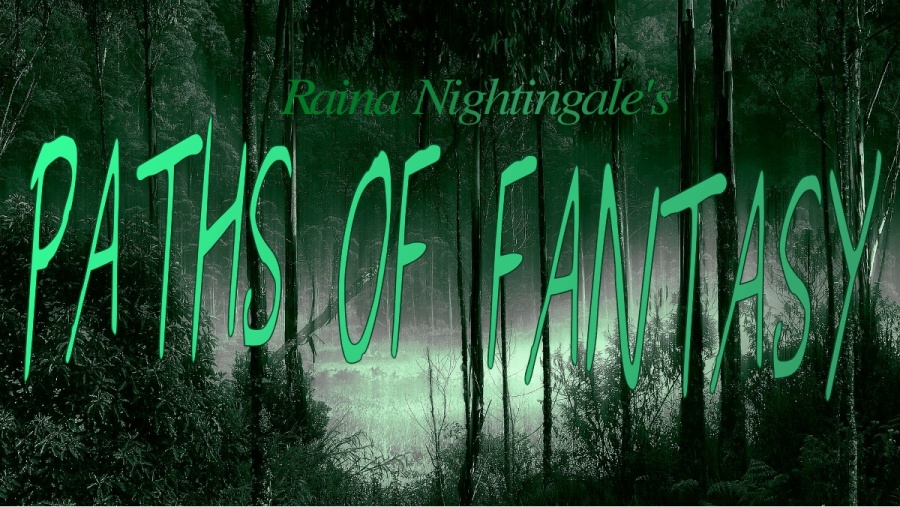Merchants of Light and Bone
 Series: Merchants of the Pentagonal Dominion, #2, Standalone
Series: Merchants of the Pentagonal Dominion, #2, Standalone
Author: Erika McCorkle
Genre: Fantasy
Book Description:
Sorrow in paradise.
A parent’s worst nightmare.
When grief drives one to revenge.
Living in a tropical paradise with his spouses and kids, Amiere is a merchant of light, a sculptor who carves glowing crystals into spectacular and powerful, demon-killing works of art. When the ground opens up near his idyllic village to reveal a massive supply of crystals, the whole nation of Aloutia celebrates. The merchants are guaranteed money for decades and officials predict Aloutia will be safe from demonkind for generations. But Amiere isn’t rejoicing—when the ground split apart, his seven-year-old daughter fell to her death.
Amiere’s grief turns to rage when an old enemy returns to the village with a young daughter displaying signs of starvation and abuse. Having witnessed his own daughter’s death, Amiere cannot bear the thought of watching another child die, especially when he can prevent it. Unable to ask police for help due to the village’s reputation of hostility toward authority figures, Amiere takes matters into his own hands, even at the risk of being exiled and separated from his family forever.
Review:
Merchants of Light and Bone is narrated by Amiere, a father and husband living with his family on the tropical beach and doing very skilled – though not “educated” – work. His narration flows very smoothly. As with everything else I’ve read by Erika so far, the writing is quite easy to read, despite the very different first person voice, and it makes the length of the book go by without much notice.
Amiere is a leonine humanoid, who lives on the beach with his spouses and his children. He is for the most part a likable character – loving and caring and kind, and capable of ferocity. He doesn’t notice it, but he’s attentive to his children’s needs, and when their needs or wants don’t line up with his understanding, he’s accepting of it, and adapts himself very well – even if he doesn’t notice that’s what he’s doing. He’s just lost his daughter, Tawny, and the grief of that loss, and how the family copes with it, is raw.
I liked the slice-of-life attention to people living their lives, navigating their relationships, grieving and struggling with grief and what they believe and how they’re going to go forward – and how other people cope in different, and sometimes, contrary ways. Relationships are, perhaps, the biggest part of this novel. And one of the things I really loved about this novel was the ferocity with which the parents will protect and fight for their children. Not the laws of the land, or anything else, if they can help it.
However, I sadly found a number of the characters somewhat flat. Amiere is not flat, and neither for the most part is Su, his non-binary gender-unknown Godblood spouse, who wishes to keep his Godblood powers secret and – for the most part – not to indulge in the reverence accorded the powerful Godbloods. For the most part, Su is sweet and kind and not overbearing, but there are several scenes when his ferocity – rightly – comes to the fore, as his family is threatened, that I found quite touching. He is poetic, sometimes. I do not think I found Liesle to be flat for the most part either, but I noticed her less except in a few cases.
The children, however, did not feel terribly vibrant to me. Their personalities most certainly did not leap off the page, and in several cases their personalities and personality traits felt tacked together. A particular example are some aspects of Cohaku’s neurodivergence. I really liked how that brought out Amiere’s relationship to his children’s needs as a parent, but she did not feel like an organic character. Not that her traits clashed, but I just couldn’t see her. She felt intentionally created. And this was true, to varying degree, for most of the children, and occasionally with Amiere’s spouses.
A couple of other things greatly diminished my ability to enjoy the book. One is the dynamic between Amiere and his spouses, and Miltico, the abusive goat-like humanoid father. I did not enjoy how that dynamic invoked the stereotype of “cautious, protective parent likely to be evil and abusive; overbearing, welcoming, open people safe and kind rescuers.” There are too many cases of children abused, sometimes sexually, because their parents didn’t protect them from strangers, or from those kinds of go-to-an-effort-to-be-jolly uncles, or pastors, or other such. So I recoiled from those interactions, cringing. I don’t know if they could have been different in the book; if something could have been done to counterbalance them in such a way that things still worked with the characters, but the flaws of the stereotype is acknowledged. I’m just saying it made me uncomfortable.
The other thing is that, though filled with fantastic and beautiful creatures – such as jeweled elephants, shroomhounds, and a Demon Lord of Terror who is only visible in mirrors – and set in just as fantastic and magical a world – with rainbow rings, arcane cities, and a fresh-water ocean that’s the body of a generally benign Demon Lord of Despair – at times, the world of Merchants of Light and Bone was far too like the modern world, a feature I don’t enjoy and which is why I generally avoid contemporary fantasy and sci-fi. I don’t really want to be reminded of the modern world or the barbaric practices made possible by more advanced technology when I read. One example of this is the way they handle Godblood prisoners – draining them of their magical blood and infusing them with other blood so they can’t use their powers – Ugh! It seems some kind of perversity and civilized torment – eew!
It’s a few lines in the book, and it doesn’t happen to any of the characters – nor do they do it – but it’s the only thing of its general kind that bothered me.
Aloutia seems like a dystopian semi-surveillance state to me, and there are revelations in this book that make me hate the Conqueror God and Mind Spirit, Lucognidus. I understand the idea that in the hands of a responsible person who actually has the Power to enforce their will, and to judge characters, other economic principles than plain Capitalism might be better. But, all in all, the whole system of Aloutia – and those revelations – seems like it’s pretty close to being a (very pretty) dystopia.
Given Lucognidus’ stated goals, I have some ideas that I wonder why he doesn’t pursue ….

I only skim-read this to avoid spoilers. This book on my to be read list after I’m done with George R.R. Martin’s ‘Fire and Blood.
LikeLiked by 1 person
😀 Am I that bad with spoilers? I tried to avoid spoilers in this review and just give a general idea of overall vibes. Do I often spill spoilers outside of the dedicated spoiler sections or without a warning?
LikeLike
Your reviews are very detailed. Some offer more than just overall vibes and a brief outline of the plot.
LikeLiked by 1 person
I’ll try to pay more attention, then, and keep most of that stuff in the Spoiler Section.
LikeLiked by 1 person